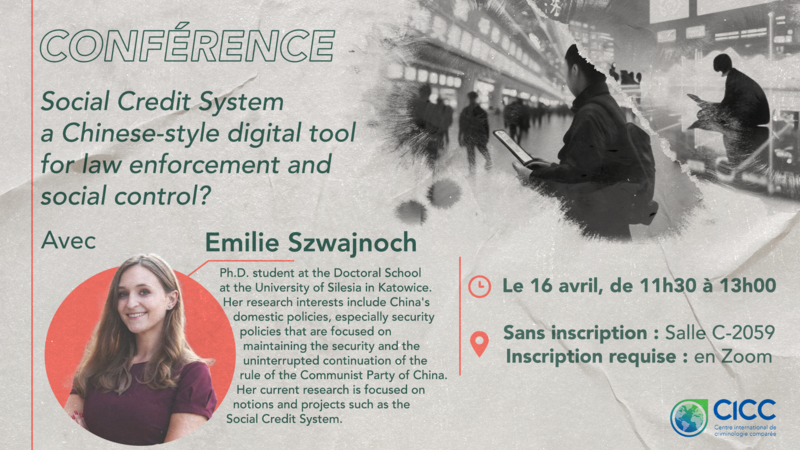
Lunchtime lecture by Emilie Szwajnoch
April 16, 11:30 a.m. to 1:00 p.m.
In hybrid: In room C-2059, Pavillon Lionel-Groulx, UdeM and in Zoom
Face-to-face places are available without registration.
The presentation is based on the outcomes of research that analyzed Chinese documents introducing the Social Credit System. I will first briefly present the SCS and the way it operates. Then, I discuss how Beijing may use it against those who break laws and regulations and what are the consequences of it. On the one hand, the SCS can deal with some types of criminal activities, and on the other – it naturally amplifies the authoritarian nature of the regime, imposes punishments which may be considered disproportionate, and has the potential to profile people in terms of their “trustworthiness” which may lead to extrajudicial consequences. I will picture this with some examples of mechanisms used (or planned) within the system. The presentation will end with a discussion of the operability of the system (or lack thereof) and the real effects it may have on law enforcement and individuals (as opposed to its potential and some initial ideas).

Emilie Szwajnoch is a Ph.D. student at the Doctoral School at the University of Silesia in Katowice. Her research interests include China's domestic policies, especially security policies that are focused on maintaining the security and the uninterrupted continuation of the rule of the Communist Party of China. Her current research is focused on notions and projects such as the Social Credit System.
Attention - Votre version d'Internet Explorer est vieille de 20 ans et peut ne pas vous offrir une expérience optimale sur le site du CICC. Veuillez mettre à jour votre ordinateur pour une expérience optimale. Nous vous recommandons Firefox ou Chrome, ou encore ChromeFrame si vous êtes dans un environnement corporatif ou académique dans lequel vous ne pouvez pas mettre à jour Internet Explorer.